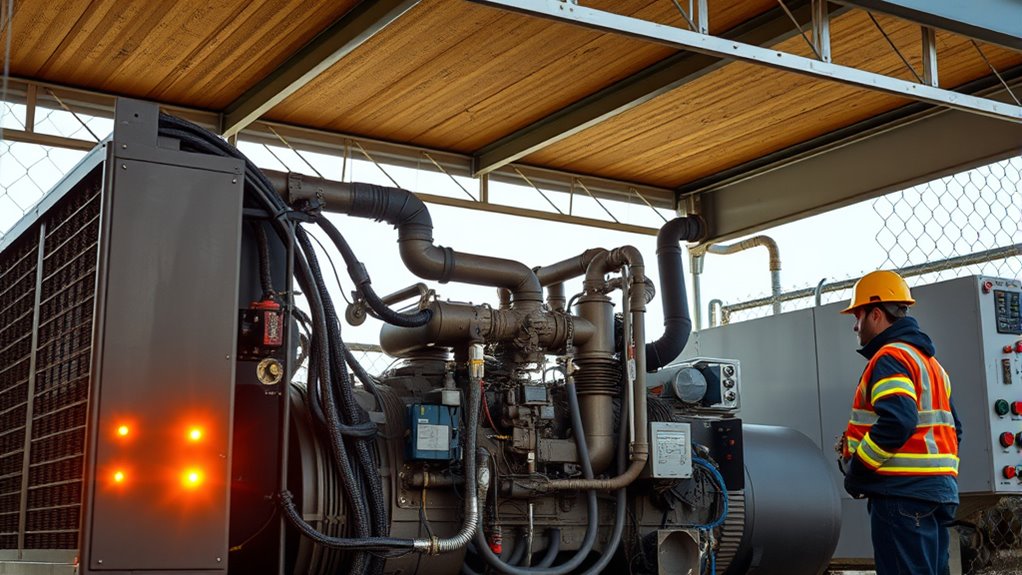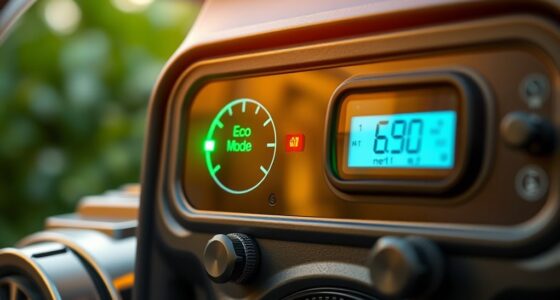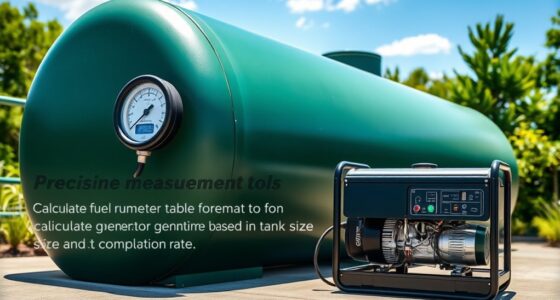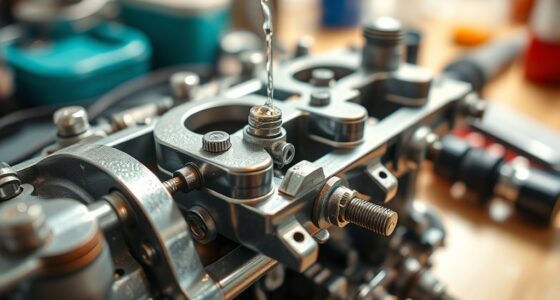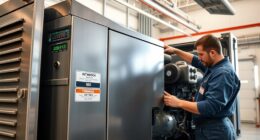Running a generator constantly carries risks like overheating, increased wear, and noise pollution, so regular maintenance is vital. Manage fuel efficiency by avoiding over- or underloading and keep safety measures, such as proper ventilation and fire extinguishers, in place. Use noise control solutions like enclosures or barriers to minimize disturbance. Staying vigilant about these practices helps ensure safe, efficient, and reliable operation—if you keep exploring, you’ll discover more tips to optimize your setup.
Key Takeaways
- Regularly schedule inspections and maintenance to prevent mechanical failures and ensure safe operation.
- Operate within optimal load levels to maximize fuel efficiency and reduce wear.
- Use safety equipment like transfer switches and fire extinguishers to minimize risks.
- Install soundproof enclosures or barriers to control noise pollution during continuous operation.
- Ensure proper ventilation and adherence to safety standards to prevent overheating and exhaust hazards.
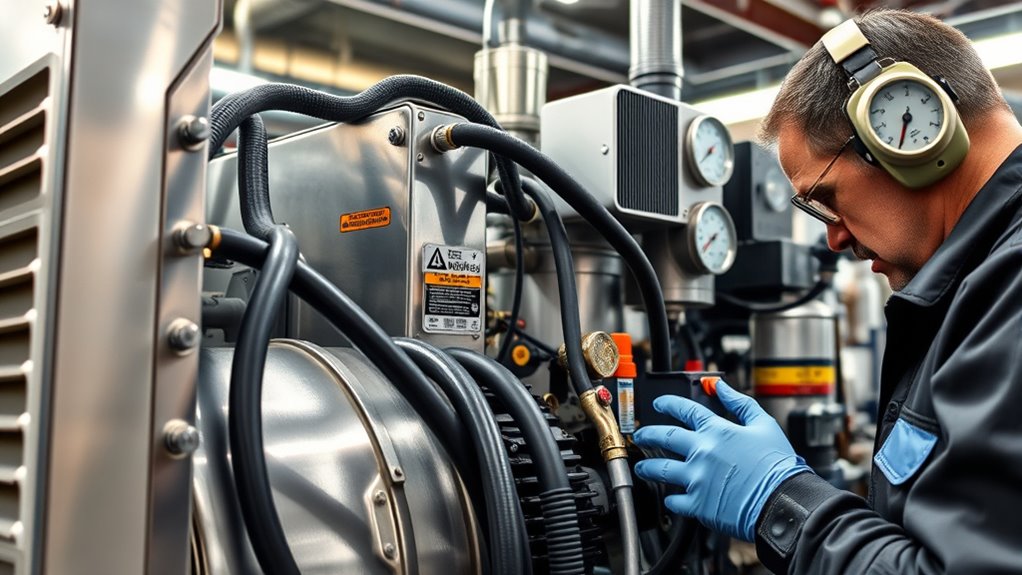
Running a generator 24/7 can be essential for guaranteeing a reliable power supply, especially in remote locations or areas prone to outages. When you operate a generator continuously, maximizing fuel efficiency becomes a top priority. You want to get the most power out of every drop of fuel, which means choosing a generator suited for long-term use and running it at ideal load levels. Overloading the generator can reduce fuel efficiency and cause unnecessary wear, while underloading might lead to unstable operation. Regularly monitoring fuel consumption helps you identify inefficiencies and adjust your usage accordingly. Using high-quality fuel can also improve efficiency, prevent engine deposits, and extend the generator’s lifespan. Additionally, considering a generator with advanced fuel management systems can help maximize fuel economy and reduce waste over time. Proper sizing and load planning are critical to ensure your generator operates efficiently and safely over extended periods.
Noise levels are another critical factor when running a generator around the clock. Continuous operation can generate considerable noise, which might disturb neighbors or violate local noise ordinances. You should select a generator designed for low noise output, especially if it’s located near residential areas or places requiring quiet environments. Installing soundproof enclosures or barriers around the generator can substantially reduce noise pollution. Regular maintenance, such as tightening loose parts and replacing worn-out mufflers, also helps keep noise levels down. Operating the generator during designated hours, if possible, minimizes disturbance and ensures compliance with local regulations. Remember, excessive noise not only impacts your surroundings but can also be a sign that your generator isn’t functioning efficiently, as increased noise sometimes correlates with mechanical issues. Consistent maintenance and proper operation are vital to keeping noise levels manageable.
Beyond fuel efficiency and noise control, running a generator 24/7 demands consistent maintenance to prevent breakdowns and ensure safety. You should schedule routine inspections, change oil regularly, and replace filters as recommended by the manufacturer. Keeping the generator clean and free from debris reduces the risk of overheating and mechanical failure. Proper ventilation is crucial, as it helps dissipate heat and exhaust gases, preventing dangerous build-ups. Always have a fire extinguisher nearby and ensure that your setup adheres to local safety standards. Using a transfer switch or automatic start system can also improve safety and convenience, allowing the generator to operate smoothly without constant manual intervention. Additionally, selecting a generator with reliable safety features can further reduce risks and protect your property. By adhering to these best practices, you minimize risks, keep the generator running efficiently, and reduce long-term costs. Running a generator 24/7 isn’t just about continuous power—it’s about doing so safely, efficiently, and quietly, so your operations remain uninterrupted and compliant with regulations.
Frequently Asked Questions
How Does Continuous Operation Affect Generator Fuel Efficiency?
Continuous operation can decrease your generator’s fuel efficiency over time, as fuel consumption rises due to efficiency degradation. When you run it nonstop, parts wear faster, causing the engine to work harder and use more fuel. This increased fuel usage not only raises operating costs but also shortens the generator’s lifespan. To maintain peak efficiency, regular maintenance and monitoring are essential, especially during long-term, continuous use.
What Are the Environmental Impacts of Running a Generator Nonstop?
Did you know that continuous generator use can produce up to 2.5 times more emissions than standard operation? Running a generator nonstop increases emissions, contributing to air pollution and climate change. It also heightens noise pollution, disturbing nearby communities. To minimize environmental impacts, prioritize emissions control measures and consider quieter, cleaner options. By doing so, you help protect the environment while maintaining reliable power.
Are There Specific Brands Better Suited for 24/7 Use?
Some brands are better suited for 24/7 use due to their durability and warranty coverage. You should consider Honda, Generac, or Kohler, as they’re known for robust build quality and reliable performance under continuous operation. These brands often offer extended warranties, providing peace of mind and support if issues occur. Choosing a reputable brand guarantees your generator can handle long-term use without frequent breakdowns, saving you money and stress.
How Can I Monitor Generator Health Remotely During Continuous Operation?
Think of your generator as a crucial organ, and remote diagnostics as its heartbeat monitor. You can monitor its health during continuous operation by integrating sensors that track temperature, oil levels, and vibration. These sensors feed data to a remote system, allowing you to analyze performance in real-time. This proactive approach helps catch issues early, ensuring your generator stays healthy and reliable without constant manual checks.
What Are the Legal Regulations for 24/7 Generator Use in Residential Areas?
You need to check local zoning restrictions and noise ordinances before running a generator 24/7 in a residential area. Many areas limit noise levels and restrict the placement of generators to prevent disturbances. Make sure to obtain any necessary permits, use soundproof enclosures if required, and follow all regulations to avoid fines or legal issues. Staying compliant helps you operate safely and responsibly in your neighborhood.
Conclusion
Running a generator 24/7 isn’t just risky, it’s like releasing a tiny, unrelenting beast that could burn down your entire world if not handled with care. Neglecting maintenance or safety measures turns your reliable power source into a ticking time bomb, ready to explode at any moment. So, stay vigilant, follow safety protocols, and treat your generator like a fragile, precious life force—because one mistake could turn your home into chaos faster than you can blink.
